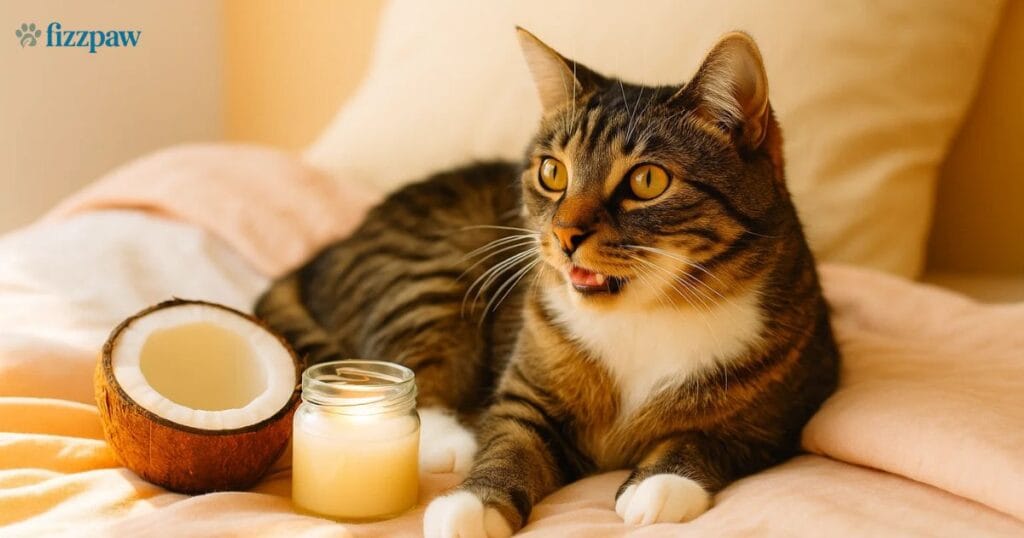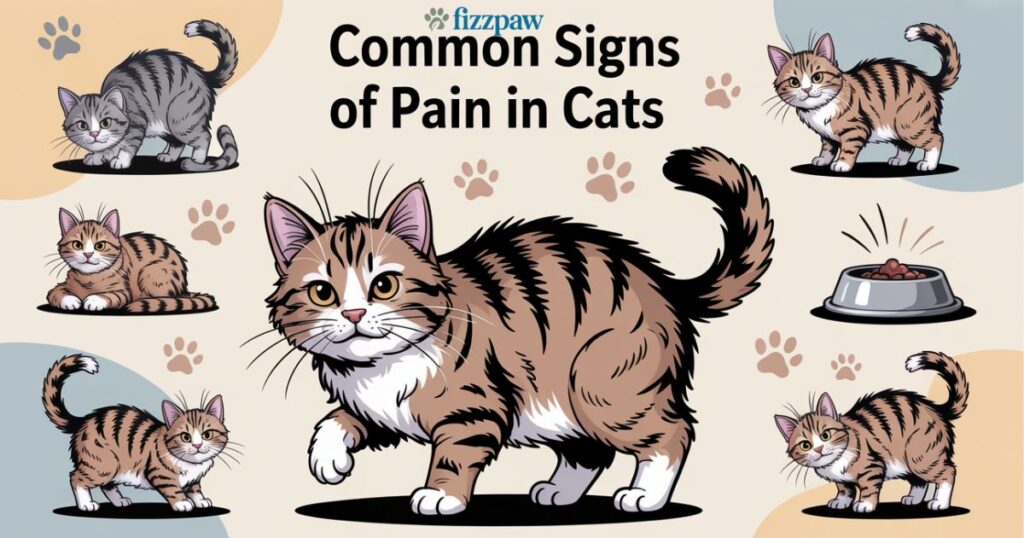Many pet owners ask, “Can I put coconut oil on my cat’s bum?” This may appear odd; however, it’s actually frequent, particularly among pet owners who face problems with hygiene.
Cats are typically adept at grooming their fur; however, certain circumstances–such as diarrhea, constipation or fur that is long can make the anal area uncomfortable or soiled. Some owners resort to coconut oil due to its natural moisturizer, which has mild anti-inflammatory and soothing properties. What appears to be an easy fix could have both risks and benefits.
Understanding how coconut oil works with feline skin care, digestion, along overall wellness is crucial before deciding to apply it.
Why People Consider Putting Coconut Oil on a Cat’s Bum
Cats are generally excellent in grooming; however, sometimes their hygiene may require a little assistance. The breeds with long hair, senior cats or kittens might have difficulty cleansing their anal area. The feces can become stuck, leading to irritation or discomfort in the skin. Coconut oil works as a natural hydrator and mild lubricant, helping make the cleaning process smoother and more comfortable.
In the USA, pet owners are often advised to attempt home remedies prior to scheduling an appointment with a vet. Coconut oil is a popular choice because it’s plant-based, inexpensive and also has anti-microbial qualities. But it’s crucial to use it properly and with the correct motives.
Also REAd: Home Remedies for Cat Constipation
Is It Safe to Put Coconut Oil on My Cat’s Bum?
Veterinarians typically say that a tiny amount of coconut oil is safe for the majority of cats, as long as it’s pure and unrefined. It can also be applied externally. It is recommended to apply it externally. The American Veterinary Medical Association warns that even natural products that are safe can be harmful if they are misused.
The primary safety issue is the ingestion. Cats groom themselves, and should your cat is careful not to lick excessively with oil and licks their stomach, it could cause stomach upset, or in rare instances, it could cause pancreatitis. In the event that your pet has a history of digestive problems or has a weight problem, you should consult your veterinarian first.
Benefits of Using Coconut Oil on the Anal Area
When properly used when used correctly, coconut oil can be beneficial in many ways:
- Softens dry fecal matter for cleaner and easier cleaning
- It moisturizes the dry, irritated facial skin, especially around the anus
- Reduces mild inflammation thanks to its calming properties
Certain cat owners have reported that using it occasionally helps to stop matting in cats with long hair. Others find it to be simple to treat mild irritation following diarrhea.
Also Read: Natural Remedies for Cat Diarrhea
Risks and Side Effects You Should Know
While coconut oil may seem harmless, it’s not risk-free:
- Ingestion risks – Over-licking can cause diarrhea or weight gain
- Allergic reactions – Rare, but possible
- Masking medical issues – It might hide signs of anal gland problems
If your cat exhibits bleeding, swelling or a persistent smell It’s best to consult a vet rather instead of resorting to homemade solutions.
Step-by-Step Guide: How to Apply Coconut Oil Safely
Checklist for safe application:
- Choose organic, unrefined coconut oil
- Wash your hands before and after application
- Gently clean your cat’s bum with a warm, damp cloth
- Warm a pea-sized amount of oil in your fingers
- Apply lightly—avoid overcoating
- Monitor your cat for licking or discomfort
Tip: Apply when your cat is calm, such as after a meal or nap.
How Often Can I Put Coconut Oil on My Cat’s Bum?
Coconut oil should only be used when it is necessary, not every day. Most cats will use coconut oil one or two times per week is sufficient for occasional assistance. In excess, it can result in more licking and greasy fur.
If you notice that you have to apply it regularly, it could be due to an anal or digestive gland issue that requires veterinary care.
Also Read: How Can I Soothe My Cat’s Itchy Skin
Alternatives to Coconut Oil for Anal Area Care
If you prefer other options, consider:
| Alternative | Benefits | Drawbacks |
| Pet-safe wipes | Easy, disposable, quick | May irritate sensitive skin |
| Warm water & cloth | Gentle, free | Less convenient |
| Vet-prescribed ointments | Targeted treatment | Requires vet visit |
Dietary fiber supplements can also help keep stools firm, reducing mess.
When to See a Veterinarian Instead
Go to a vet if you notice:
- Swelling or redness that worsens
- Foul odor despite cleaning
- Blood or pus around the anus
- Scooting on the floor frequently
These signs could indicate anal gland impaction or infection, which needs professional care.
Frequently Asked Questions
Q1: Can I put coconut oil on my kitten’s bum?
Yes, but only a very tiny amount and after vet approval. Kittens have sensitive skin and weaker digestion.
Q2: Will coconut oil help with my cat’s constipation?
No, topical use won’t fix constipation. Dietary changes or vet treatment are needed.
Q3: Is fractionated coconut oil better for cats?
Fractionated oil is less greasy but has fewer natural compounds. Regular unrefined oil is preferred for skin care.
Q4: Can coconut oil treat anal gland problems?
No, it can’t replace veterinary procedures like gland expression.
Q5: What if my cat licks off the coconut oil?
Small amounts are usually harmless, but monitor for diarrhea or vomiting.




